牛津高中英语模块五第一单元学案
- 格式:doc
- 大小:199.50 KB
- 文档页数:18
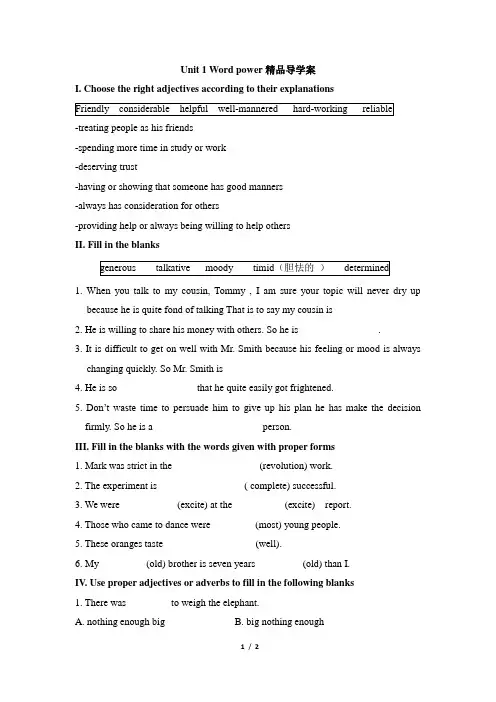
Unit 1 Word power精品导学案I. Choose the right adjectives according to their explanations-treating people as his friends _________________-spending more time in study or work _________________-deserving trust _________________-having or showing that someone has good manners _________________-always has consideration for others ________________-providing help or always being willing to help others _________________II. Fill in the blanks1. When you talk to my cousin, Tommy , I am sure your topic will never dry upbecause he is quite fond of talking That is to say my cousin is ______________2. He is willing to share his money with others. So he is _______________ .3. It is difficult to get on well with Mr. Smith because his feeling or mood is alwayschanging quickly. So Mr. Smith is ___________________4. He is so _______________ that he quite easily got frightened.5. Don’t waste time to persuade him to give up his plan he has make the decision firmly. So he is a _____________________ person.III.Fill in the blanks with the words given with proper forms1. Mark was strict in the _________________(revolution) work.2. The experiment is _________________( complete) successful.3. We were ___________(excite) at the __________(excite) report.4. Those who came to dance were_________(most) young people.5. These oranges taste __________________(well).6. My _________(old) brother is seven years_________ (old) than I.IV. Use proper adjectives or adverbs to fill in the following blanks1. There was ________ to weigh the elephant.A. nothing enough bigB. big nothing enough1/ 2C. nothing big enoughD. big enough nothing2. --- Why do you enjoy listening to records?---I guess records are often __________ an actual performance.A. as good as or better thanB. as good or better thanC. like good or better thanD. as good as any of3. Those exercises are not easy. You can not do them _________.A. carefully enoughB. more carefullyC. carefullyD. careless2/ 2。
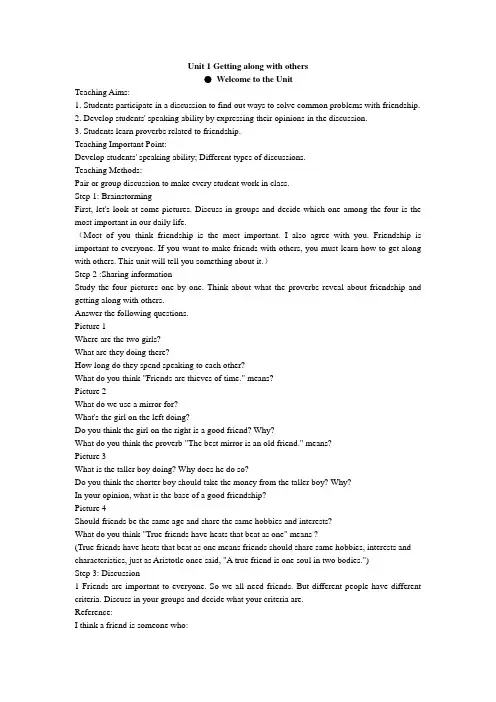
Unit 1 Getting along with others●Welcome to the UnitTeaching Aims:1. Students participate in a discussion to find out ways to solve common problems with friendship.2. Develop students' speaking ability by expressing their opinions in the discussion.3. Students learn proverbs related to friendship.Teaching Important Point:Develop students' speaking ability; Different types of discussions.Teaching Methods:Pair or group discussion to make every student work in class.Step 1: BrainstormingFirst, let's look at some pictures. Discuss in groups and decide which one among the four is the most important in our daily life.(Most of you think friendship is the most important. I also agree with you. Friendship is important to everyone. If you want to make friends with others, you must learn how to get along with others. This unit will tell you something about it.)Step 2 :Sharing informationStudy the four pictures one by one. Think about what the proverbs reveal about friendship and getting along with others.Answer the following questions.Picture 1Where are the two girls?What are they doing there?How long do they spend speaking to each other?What do you think "Friends are thieves of time." means?Picture 2What do we use a mirror for?What's the girl on the left doing?Do you think the girl on the right is a good friend? Why?What do you think the proverb "The best mirror is an old friend." means?Picture 3What is the taller boy doing? Why does he do so?Do you think the shorter boy should take the money from the taller boy? Why?In your opinion, what is the base of a good friendship?Picture 4Should friends be the same age and share the same hobbies and interests?What do you think "True friends have heats that beat as one" means ?(True friends have heats that beat as one means friends should share same hobbies, interests and characteristics, just as Aristotle once said, "A true friend is one soul in two bodies.")Step 3: Discussion1 Friends are important to everyone. So we all need friends. But different people have different criteria. Discuss in your groups and decide what your criteria are.Reference:I think a friend is someone who:*is trustworthy*is honest, affectionate and loving*shares happiness and sorrow*is loyal to me*can point out my mistakes sincerely*is not selfish2. We value friendship today and through the history the ancient people also treasured it very much. They left us many valuable proverbs and sayings. Here are some:1. 多个朋友多条路。
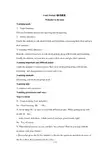
Unit1 Period 1参考教案Welcome to the unitTeaching goals1.Target languageDiscuss friendship and practise agreeing and disagreeing.2.Ability objectivesEnable the students to talk about friends and friendship,expressing their ideas and give their opinions.3. Learning ability objectivesHelp the students learn how to talk about getting along with friends and friendship. Enable the students to learn how to express their ideas and give their opinions.Teaching important and difficult pointsGuide the students to learn to express their ideas about getting along with friends,friendship and characteristics in a friend and so on.Teaching methodsDiscussing, pair work and group work.Teaching aidsA computer and a projector.Teaching procedures and waysStep I Lead-inT:Good morning, boys and girls!Ss:Good morning, Mr./Ms…T:In our daily life,we have to deal with different people.While getting along with people w e maymake friends with them.I think most of you have good friends, right?Ss:Yes, of course.T: What kind of person can you call him / her a friend? How do you deal with the problems with your friends?( The teacher gives the Ss five minutes to discuss the questions and then ask some of the Ss to show their opinions for the class.)Step 2 Welcome to the unitLet the students talk about some proverbs about friends and friendship and then answer some questions about the topic.T:OK! Now 1 will show you some illustrations and proverbs about friends and friendship.Let’s look at the four illustrations and read the proverb under each one.I’d like to divide you into four groups. each group focusing on one illustration.You can use your common knowledge and experience to describe each illustration and tell us what the proverb means in your own words.Now I’d like to give you five minutes to discuss the illustrations and proverbs.Ss:Yeah!Show them on the screen.While the students are discussing,m ove around to help them if necessary.T:Time is up.Are you ready?Ss:Yes.T:Who’d like to tell us something about the first picture and the first proverb?S:Let me have a try.In the first picture two girl are talking and drinking happily and the clock tells us that they have been doing so for three hours.They are absorbed in the conversation.So the proverb“Friends are thieves of time.”means. when you spend time with your friends, you always feel how time flies.It means 朋友是时间的窃贼T:Very good.Group 2.What about your description?S:From Picture 2 and the proverb“The best mirror is an old friend”,we can know that an old friend is like a mirror, because an old friend is the one who knows almost all about you Only he or she knows you most, especially your strength and weakness. It means老朋友如同最好的镜子T:You are quite right. We should treasure our friendship with friends,especially with old friends.Now whose turn is it to give your description?……….Picture3: There are two boys in the picture. The taller boy is giving money to the other boy and trying to persuade him to be his friend. Theshorter boy looks puzzled.He is not sure whether he should take the money or not. True friendship is priceless. If you can buy a person’s _friendship_, i t’s not worth having. It means如果你能买到一个人的友谊,那么这种友谊就根本不值得拥有.Picture4:True friends have _hearts that beat as one.Friends understand each other from the bottom of their hearts. It means真正的朋友心灵相犀.Step3 DiscussionAsk student to read the three questions below the pictures to make sure that everyone understands them.Ask hem to discuss the three questions.Then ask some students to report their answers to the class.1. Do you have a best friend? Why do you think that he or she is your best friend?2. What do you think are the most important characteristics in a friend?(A friend is someone who is trustworthy; you respect and who respects you; is honest, affectionate and loving; shares your happiness and sorrow; accepts your differences; is devoted and loyal to you; is selfless.)3. Do you think good friends should have the sme interests? Why or why not?Step4 language points1.Almost everyone wants to make friends and develop friendships with others.(Page 1,Line 1)develop vt. 开发;使成长,使发达,发展;逐渐产生;逐渐养成;患(病);vi.发展Swimming develops the muscles.Her friendship with David developed slowly.developed adj. 发达的developing adj. 发展中的development n. 发展;开发经典回放One of the best ways for people to keep fit is to______ healthy eating habits.(2006 湖北)A. growB. developC. increaseD. raise2.What do you think the proverbs tell us about friendship and getting along with others?( Page1 Line 2 )该句为含有do you think 结构的一个特殊疑问句. 主语为the proverbs; 谓语为tell; what为tell的直接宾语;about 引导的介词短语作定语.get along 相处;进展get along /on with sb. 与某人相处get along/ on with sth. 在某事上取得进展How are you getting along these days?He is always getting along/ on well with his classmates.3.If you can buy a person’s friendship, it’s not worth having. (Page1,picture 3)) worth adj.“值”(后接价值数量词);值得(后接名词、代词、动名词但不能接动词不定式The car is worth 1000 dollars.It’s worth our work.The book is well(十分,很,不能用very)worth reading.worthy adj. 有价值的, 值的。
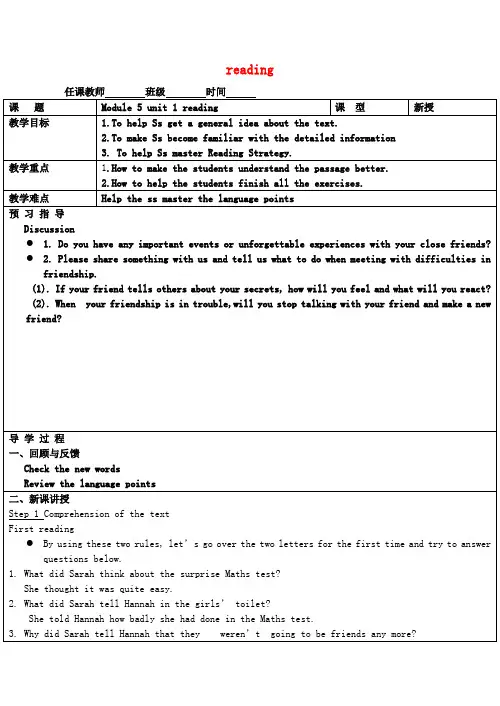
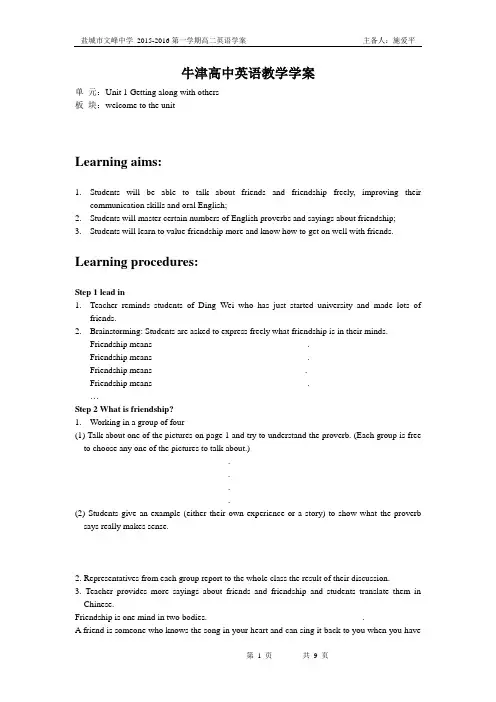
牛津高中英语教学学案单元:Unit 1 Getting along with others板块:welcome to the unitLearning aims:1.Students will be able to talk about friends and friendship freely, improving theircommunication skills and oral English;2.Students will master certain numbers of English proverbs and sayings about friendship;3.Students will learn to value friendship more and know how to get on well with friends. Learning procedures:Step 1 lead in1.Teacher reminds students of Ding Wei who has just started university and made lots offriends.2.Brainstorming: Students are asked to express freely what friendship is in their minds.Friendship means ___________________________________.Friendship means ___________________________________.Friendship means___________________________________.Friendship means ___________________________________.…Step 2 What is friendship?1.Working in a group of four(1) Talk about one of the pictures on page 1 and try to understand the proverb. (Each group is free to choose any one of the pictures to talk about.)___________________________________.___________________________________.___________________________________.___________________________________.(2) Students give an example (either their own experience or a story) to show what the proverb says really makes sense._____________________________________________________________________________ _____________________________________________________________________________ ___________________________________________________________________________2. Representatives from each group report to the whole class the result of their discussion.3. Teacher provides more sayings about friends and friendship and students translate them in Chinese.Friendship is one mind in two bodies. ___________________________________.A friend is someone who knows the song in your heart and can sing it back to you when you haveforgotten the words. ___________________________________.Hold a true friend with both your hands. Everyone hears what you say. Friends listen to what you say.Best friends listen to what you don't say. ___________________________________. ___________________________________________________________________________3.Students are encouraged to think of more such proverbs and sayings and share with eachother._______________________________________________________________________________ _______________________________________________________________________________ ____________________________________________________________________Step 3 What makes a good friend?Students are asked to think about the qualities of a good friend and then write their ideas down.A good friend should be:_______________________________________________________________________________ _______________________________________________________________________________ ____________________________________________Step 4 How can we get along well with our friends?1. Read the following words:The recipe of friendship:1 cup of sharing2 cups of caring1 cup of forgiveness and hugs of tendernessMix all these together ...Write down your own ways you get along well with your friends._____________________________________________________________________________ _____________________________________________________________________________ ___________________________________________________2. Work in a group and share with each other their ways of getting along well with friends.Step 5 Conclusion of the lesson(PPT 13-15)Students together read aloud the poem: A Friend…to end the lesson.A f riend …Accepts you as you areBelieves in “you”Calls you just to say “Hi”Doesn’t give up on youEnvisions the whole of youForgives your mistakesGives unconditionallyHelps youInvites you overJust be with you牛津高中英语教学学案单元:Unit 1 Getting along with others板块:ReadingLearning aims:1.Students will understand the two passages well;2.Students will know the basic formation of a letter to a magazine advice columnist;3.Students will learn and use the reading strategy: reading to understand feelings;4.Students will learn how to mend a broken friendship and how to make their friendship lastlong.Learning procedures:Step 1 lead in1.Students do self-reflection: Think of the most recent fight with your friend. What caused it? _______________________________________________________________________________ ____________________________________________________________________________2.Group work:(1)Work in a group of four and discuss all the possible reasons leading to a broken friendship._______________________________________________________________________________ ______________________________________________________________________________(2)Different groups exchange the pieces.3.Brainstorming:Who can we turn to for help when we have problems with our friends?________________________________________________________Step 2 Reading of Secrets and Lies (PPT 8-14)1. Students read the title of the passage and the first sentence of the first paragraph, and try to predict the main idea of the letter.______________________________________________________________________________ 3.Fast reading: Students go through the whole letter to find out:What is the secret ?______________________________________What is the lie?____________________________________________3. Careful reading: Students read the letter again, this time carefully and try to answer the following questions:(1)Why do you think Sarah and Hannah could be good friends before?___________________________________________________________(2) Why did Sarah tell Hannah that they weren’t going to be friends any more?_____________________________________________________________(3)What might have caused their friendship to break?_________________________________________________________Step 3 Reading strategy: reading to understand emotion1. Analyze the letter:what is a letter asking for help like?__________________________A letter to a magazine columnist usually includes:1)____________________________________2)________________________________________I dentify the writer’s feelings :__________________________________________________________2. Teacher guides students to take Sarah’s letter:__________________________________.4. A game: Students are encouraged to express different emotions without mentioning the wordsfor the emotions._______________________________________________________________________________ _______________________________________________________________________________ _________________________________________Step 4 Reading of A friendship in trouble and the practice of Reading strategy1. Students read A friendship in trouble, and try to find out Andrew’s problem and how he feels2. Students work in pairs and in their own words, tell each other what Andrew’s problem is and what caused his friendship with Matthew in trouble._______________________________________________________________________________ _______________________________________________________________________________ _______________________________________________________________________________ ________________Step 5 Problem solvingStudents work in a group of four, and try to finish the following two tasks:Task one:1. Suppose you are the columnist, what advice will you give Sarah and what to Andrew? Choose one of the topics and try to think of as much advice as possible.______________________________________________________________________2. Write down your advice on the blackboard freely.______________________________________________________________________Step 6 Conclusion牛津高中英语教学学案单元:Unit 1 Getting along with others板块:Grammar and usageLearning objectives:5.Students will find out and learn the functions of To-infinitive in a sentence and its differentforms by involving themselves in different activities, games and competitions;6.Students will know how to use Bare infinitive;7.Students will further learn how to get along well with friends.Learning procedures:Step 1 lead inReview the basic sentence elements.I was watching an English programme at 8 o’clock yesterday.Scuba-driving seems exciting .I cannot find my history book.To talk with your mouth full is rude.Step 2 Different functions of To-infinitive1. Study the two letters on Page 5, trying to find out more To-infinitives in the letters and tell their functions in the sentences.(1) ________________________________________________(2) _________________________________________________(3)___________________________________________________(4) ____________________________________________________2. Read the points one by one on page 8 and analyse the sentences:动词不定式由“___+_______”构成,其否定形式是“________”。
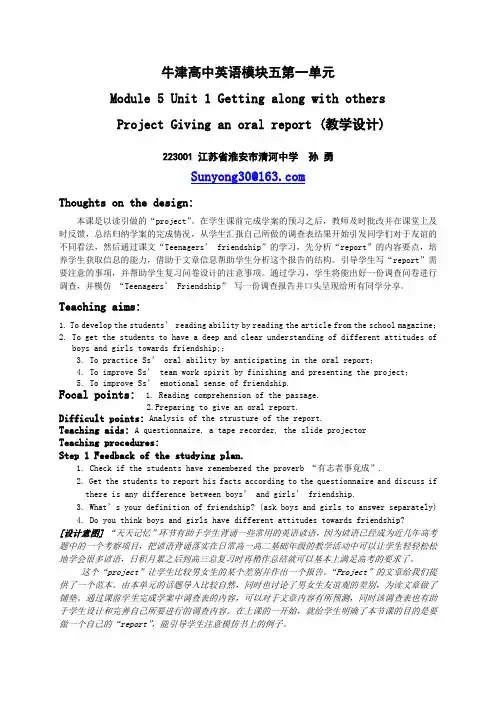
牛津高中英语模块五第一单元Module 5 Unit 1 Getting along with othersProject Giving an oral report (教学设计)223001 江苏省淮安市清河中学孙勇Sunyong30@Thoughts on the design:本课是以读引做的“project”。
在学生课前完成学案的预习之后,教师及时批改并在课堂上及时反馈,总结归纳学案的完成情况,从学生汇报自己所做的调查表结果开始引发同学们对于友谊的不同看法,然后通过课文“Teenagers’ friendship”的学习,先分析“report”的内容要点,培养学生获取信息的能力,借助于文章信息帮助学生分析这个报告的结构。
引导学生写“report”需要注意的事项,并帮助学生复习问卷设计的注意事项。
通过学习,学生将能出好一份调查问卷进行调查,并模仿“Teenagers’ Friendship”写一份调查报告并口头呈现给所有同学分享。
Teaching aims:1. To develop the students’reading ability by reading the article from the school magazine;2. To get the students to have a deep and clear understanding of different attitudes ofboys and girls towards friendship;;3. To practice Ss’ oral ability by anticipating in the oral report;4. To improve Ss’ team work spirit by finishing and presenting the project;5. To improve Ss’ emotional sense of friendship.Focal points: 1. Reading comprehension of the passage.2.Preparing to give an oral report.Difficult points:Analysis of the strusture of the report.Teaching aids: A questionnaire, a tape recorder, the slide projectorTeaching procedures:Step 1 Feedback of the studying plan.1. Check if the students have remembered the proverb “有志者事竟成”.2. Get the students to report his facts according to the questionnaire and discuss ifthere is any difference between boys’ and girls’ friendship.3. What’s your definition of friendship? (ask boys and girls to answer separately)4. Do you think boys and girls have different attitudes towards friendship?[设计意图] “天天记忆”环节有助于学生背诵一些常用的英语谚语,因为谚语已经成为近几年高考题中的一个考察项目,把谚语背诵落实在日常高一高二基础年级的教学活动中可以让学生轻轻松松地学会很多谚语,日积月累之后到高三总复习时再稍作总结就可以基本上满足高考的要求了。
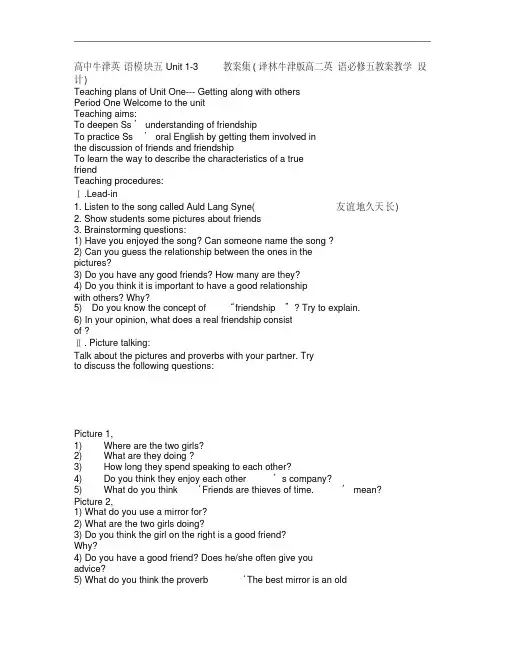
高中牛津英语模块五 Unit 1-3 教案集(译林牛津版高二英语必修五教案教学设计)Teaching plans of Unit One--- Getting along with othersPeriod One Welcome to the unitTeaching aims:To deepen Ss’ understanding of friendshipTo practice Ss’ oral English by getting them involved inthe discussion of friends and friendshipTo learn the way to describe the characteristics of a truefriendTeaching procedures:Ⅰ.Lead-in1. Listen to the song called Auld Lang Syne(友谊地久天长)2. Show students some pictures about friends3. Brainstorming questions:1) Have you enjoyed the song? Can someone name the song ?2) Can you guess the relationship between the ones in thepictures?3) Do you have any good friends? How many are they?4) Do you think it is important to have a good relationshipwith others? Why?5) Do you know the concept of “friendship”? Try to explain.6) In your opinion, what does a real friendship consistof ?Ⅱ. Picture talking:Talk about the pictures and proverbs with your partner. Tryto discuss the following questions:Picture 1,1) Where are the two girls?2) What are they doing ?3) How long they spend speaking to each other?4) Do you think they enjoy each other’s company?5) What do you think ‘Friends are thieves of time.’ mean?Picture 2,1) What do you use a mirror for?2) What are the two girls doing?3) Do you think the girl on the right is a good friend?Why?4) Do you have a good friend? Does he/she often give youadvice?5) What do you think the proverb ‘The best mirror is an oldfriend’ mean?Picture 3,1) What is the taller boy doing ?2) Why does he do so?3) Do you think it possible for a person to buyfriendship?4) In your opinion, what is the base of a goodfriendship?Picture 4,1) Do you think friends should be the same age and share the same hobbies and interests?2) What does the proverb ‘True friends have hearts that beat as one.’Ⅲ. Story-tellingTell a story happened between you and your best friend.Ⅳ. Discussion1) What a true friend should be like?A friend is someone who---you respect and who respects you---shares your happiness and sorrow---is trustworthy---is honest, loving---is devoted and loyal to you---is selfless2) Try to think of more proverbs related to friendship.For example,A life without a friend is a life without a sun.A man who has friends must show himself friendly.Ⅴ. ExtendingMore proverbs about friendshipⅥ. ConclusionWhat else can be our friends besides human beings?There are many answers to this question. e. g. a dog, acat, a dictionary, a computer, a toy car, a mobile phone, aTV set…As long as we have loveⅧ. Homework1. Smile to your friends.2. Finish the passage in Part B.3. on page 95 in Workbook..4. Preview the reading part.Period Two Reading (One)Teaching aims:To deepen Ss’ insight into problems between f riends To practice Ss’ reading comprehension skillTo identify feelings and emotions in a textTeaching procedures:Ⅰ.Lead-in1. Show students a picture about a gang of friends.It’s a picture of me. Can you find me out and guess whoare the others. (My friends)2. Brainstorming questions:1) Do you have a friend? How do you get along with yourfriends?2) Have you ever fallen out with a very good friend?3) If you had a quarrel with a friend, how would you dealwith it?4) How would you mend a broken friendship?3. Before reading the letters about broken friendships,analyse the reasons that might lead to a broken friendship.---having little in common---lacking trust---there being conflict of interest---being jealous of each other---being indifferent to each otherⅡ. Fast-readingAsk the students to go through the two letters quickly andanswer questions in Part A1. Are the writers of the two letters feeling happy or sad?2. What did Sarah get for the surprise Maths test?3. Is Matthew usually a quiet boy?Ⅲ. Detailed-reading1. Ask the students to read the first letter carefully andanswer the following questions and an analysis diagram .1) Why other children say we are no fun?2) What did Sarah think about the surprise Maths test?3) What did Hannah sense?4) What did Sarah tell Hannah in the girls’ toilets?5) Why did Sarah tell Hannah that they weren’t going to be friends any more?6) The analysis diagram:She felt betrayed because … she thought her bestfriend Hannah didn’t keep her sec ret.shamed she scored the lowest score inher class.upset she found a piece of paper onher desk that said ‘Stupid Sarah got a D’angry she thought Sarah didn’t keepher word.2. Ask the students to read the second letter carefully andanswer the following questions and fill in a table.1) Why did Andrew shout at Mathew after the match?2) What did Matthew think about losing the match?3) How did Andrew think of football?4) What kind boy is Matthew?5) How is Matthew recently?6) Fill in the table:How Andrew felt Why she felt so?He had a dilemma. His best friend Matthew has stoppedtalking to him.He felt really guilty. He said some really cruel thingsto Matthew.He was angry with Matthew. They lost the game because of Matthew’s carelessness.Ⅳ. Summarize the reading strategy according to the emotionanalysis and tale above: read to understand emotionⅤ. ConsolidationComplete two letters written by Agony Aunt back to thetwo students with the proper words.Ⅵ. Role playDivide the students into groups of three. Each group isformed with Agony Aunt Annie, Sarah and Hannah or AgonyAunt Annie, Andrew and Matthew. Just suppose they arehaving a face-to-face talk. Students are expected to act itout after a few minutes’ preparation.Ⅶ. DiscussionWhat is a friendship?Read a poem--- The ABC’s of FriendshipⅧ. Homework1. Retell the two letters.2. Write an article about the friendship in your mind.Period Three Reading (Two)--- Language PointsTeaching aims:To deepen Ss’ understanding of the two letters.To help Ss master the important words and phrases in thetext.To introduce a few sentence structures to Ss.Teaching procedures:Ⅰ.Lead-in1. RevisionRetell the main idea of the two letters.Discussion: Will they be good friends again?Ⅱ.Words1. Match the words with the correct definitionsacademic make jokes and laugh at someone deliberately a situation where one can’t decide what to dotease shout or say loudlydilemma feeling shamed of somethingdone wrongbrilliant good at studying and gettinghigh marksyell be kind and like to meet newpeopleoutgoing extremely good, clever andexcellentguilty done in a planed way, onpurpose2. Complete the sentences with the words on the leftThough he is a popular student, he is not very academic.I don’t know what to do. Actually I am in a dilemma .After saying sorry to her, I didn’t feel guilty anylonger.He is quite outgoing and has lots of friends.Don’t get upset I was only teasing .He is so brilliant that he can always think of new ideas.It is impolite to yell at the old.I don’t think the young boy run into the old womandeliberately.Ⅲ. PhrasesExplain the underlined words and make a sentenceaccording to the picture given.1. I was determined to be cheerful…(Line 14)do something with a firm desireeg. Though she loved him, she was determined to leave him.2.… , and told her we weren’t going to be friends any more because she couldn’t keep her word.(Line 24)do what one has promisedeg.She is a good girl and can always keep her word.3. … , and as a result of his careless playing, we lost thegame.(Line 38)because ofeg. As a result of his careless study, he failed the Mathstest.4. … I cannot help wondering if she wants Peter to be hisbest friend instead of me.(Line 53)cannot take control of oneself and do… eg. When thinking to the jokes, I can’t help laughing.5 … I must have sounded very proud of myself after thetest.(Line 8)must have done means guessing that something has happened because there seems to be no other possibility.More sentences in the text:… Hannah must have deliberately told everyone about my mark...(Line 21)How they must have laughed behind my back!She said that someone must have heard us in thetoilets, but I don’t believe her.eg.It must have snowed yesterday.Ⅴ. SentencesWhat does the word mean in different sentences?1. Hannah sensed something was wrong. (Line 14)He doesn’t seem to have any sense of humor.There is no sense in getting upset about it now.One day he will come to his senses and see what a foolhe has been.This article does not make sense to me.2. He kept on saying really mean things to hurt me. (Line44)Watch him. He can be really mean.Don’t be so mean about money.This word means a kind of meat in English.I didn’t mean to hurt you.3. I feel really guilty because I said some really cruelthings too, but I can’t stand seeing our team lose. (Line 46)All the audience stood and clapped.He is too weak to stand.Stand the bedroom against the door.There is a fruit stand in the street.Ⅵ.Sturctures1.He said it wasn’t his fault if he couldn’t play as well as me and that I shouldn’t yell at him.If there are two object clauses in one sentence, that isused at the beginning of the second object clause andcannot be left out.eg.She said (that) she would fly to Paris and that she wouldbring me a present.2.Since the mach, he hasn’t spoken to me even though we sit next to each other in class.They decided to leave each other even though they lovedeach other.3. Various forms of a verb… how I was sure to get a good mark. (Line 9)I was determined to be cheerful. (Line 14) toinfinitiveI made her promise not to tell anyone. (Line 16)---- bare infinitiveI was so upset that I felt like crying. (Line 20)My best friend Matthew has stopped talking to me. (Line 34) … as a result of his careless playing, we lost the game. (Line 39) V-ing form as a nounⅦ. Homework1. Review the useful phrases and important words in this text.2. Review the two sentence structures learnt above.3. Finish Parts A1 and A2 on Page 90 in workbook. Period Four Word PowerTeaching aims:To enlarge Ss’s vocabulary about personality.To help Ss recognize positive and negative adjectives about personality.To introduce synonyms and antonyms to Ss.Teaching procedures:Ⅰ.Lead-inQuestions:1. Think of one of your friends and make a description.2. What kind of person is easy to make friends with?3. What kind of person is hard to make friends with?Write down the adjectives on the blackboard.Ⅱ.Read the dialogueAsk Ss to pair work the dialogue and try to get the meaning of the adjectives.Go through the first table and figure out positiveadjectives and negative adjectives to describe personality. Ⅲ. CompetitionEncourage Ss to come up with more adjectives to describe personality.Divide the Ss into two groups, the group which comes up with more groups will be the winner.Ⅳ. Synonyms and AntonymsIntroduce the definition of synonyms and antonyms to the Ss.Go through the second table and do some more exercises. Ⅴ. Consolidation1. Figure out the adjectives according to the meaning on the left.2. Finish the exercises on Page 7Ⅵ. Game --- Describe and GuessOne student is going to stand in front of the class and describe the personality of one of his/her friends, theothers are going to guess out who the person is. The onewho guess it out can have a chance to go to the front.Ⅶ. Have a thinkingHave a summary of what we have learnt in this period of class.Ask Ss to think about two questions:Do you want to be popular?Do you want to make true friends?So we should build a positive personality.Ⅷ. HomeworkFinish the relevant exercises in the Unit Revision.Period Five Grammar (1)Teaching aims:To recognize the basic forms of the to-infinitive and thebare infinitive.To learn how to use to-infinitives and bare infinitives in different situations.Teaching procedures:Ⅰ.Lead-inLook at some proverbs about friendship and pay attentionto the words in red.1) A faithful friend is hard to find.2) The only way to have a friend is to be one.3) It is better to be alone than in bad company.Ⅱ.Functions of to-infinitive1) subject of a sentence2) object3) object complement4) attribute5) predicative6) adverbialⅢ. Functions of bare infinitive1) We use the bare infinitive after:* let and make and sometimes have* verbs of perception: feel, hear, see and watch* Would rather, had better and why not2) When two infinitives are joined by and, or, expect, but, than, rather than, we normally use the bare infinitive forthe second infinitive.Ⅵ. Consolidation1. Turn to page 9 and complete the letter.2. Retell the letter to your partner using your own language.Ⅶ. HomeworkFinish C1 on page 100 in Workbook and relevant exercises in Unit RevisionSome more exercises are prepared if time permits.Period Six Grammar (2)Teaching aims:To recognize the basic form of the verb-ing.To learn how to use the verb-ing form as a noun in different situations.Teaching procedures:Ⅰ.Lead-inShow Ss some proverbs and ask them to pay attention to the words in red.Saying is one thing and doing another.Seeing is believing.Constant dripping wears away a stone.Reading enriches the mind.Ⅱ.1. Functions of verb-ing1) subject2) predicative3) object4) after possessive pronouns5) in compound nouns2. We use a verb-ing form, not an infinitive after these verbs: admit, dislike, imagine, delay, consider, mind, understand, avoid, enjoy, practise, miss, finish, keep, suggest.3. We can use a verb-ing form or an infinitive after the following verbs, with little difference in meaning: continue, prefer, begin, hate, like, start, love4. Some verbs can be followed by a verb-ing form or a to-infinitive , but with some different in meaning or usage: forget, regret, remember, mean, try, go onforget + to-infinitive (an activity that has not been done) forget + verb-ing form (an action that has been done)5. Some common phrases are used with verb-ing forms.Would you mind ……cannot help……look forward to……feel like……cannot stand……it is no use/ good……put off……keep on…Ⅲ. ConsolidationComplete the letter on page 11Ⅵ.Discussion:State your opinion on visiting Internet chat rooms.Ⅶ. More exercisesⅦ. HomeworkPeriod Seven Task (1)Teaching aims:To practice Ss’ listening ability by taking notes. To practice Ss’ oral ability by express agreement and disagreementTeaching procedures:1. Lead-in1) InterviewOne or two of our classmates has been abroad in thissummer. Now you have a chance to interview him/her. Writedown his/her answers.Give some hint about how to take notes.2) Watch a video about an interview, and try to take notesabout the answers.Ⅱ.Skills building1: writing down the answersThink about what questions to ask and write them downin advance.Write brief notes only, not whole sentences.Make meaningful notes.Use contractions and abbreviations whenever possible.If you don’t hear or understand an answer, ask the otherperson to repeat it. You can use expressions such as:Could you say that again?Could you repeat that, please?Did you say… or…?Ⅲ.Listen to the tape and answer the questions on page 12.First read the instruction in the box and try to answertwo easy questionsThen listen to the tape and answer the questions.Ⅵ.Step1 calling Teen Talk for adviceRead the leaflet about Teen Talk.Then complete the notes.Listen to the tape and finish part BⅦ. Discussion1.Interview the classmates and fill in the chart.2.According to the result of the interview, try todiscuss some statements on friendship with classmates.3.Expressions of agreeing or disagreeing.Ⅶ. HomeworkReview what we have learnt today and write a letter to yourfriend about what his/her friendship means to you.Keep the ideas on Page 17 in mind when you write.your feelings about friendshipyour feelings about best friendsthe quantities of a good friendwhat makes a good friendship lastPeriod Eight Task (2)Teaching aims:To practice Ss’ listening ability by listening to others’ composition.To practice Ss’ proo freading ability by checking eachother’s composition.Teaching procedures:1. Lead-inReview what we have learnt in Skills building 1 and Skillsbuilding 2Listen to the composition of one student and the others tryto find out his mistakes.Ⅱ.Skills building 3 : proofreadingWhat careless mistakes do we often make in our compositions?facts?grammar?handwriting?punctuation?vocabulary?spelling?styleTip: instruct students of how to make corrections.Ⅲ.PracticeProofread the article on page 16Ⅵ.Further practiceProofread a few sentences and one more piece of writing.Ⅶ.Consolidation?proofread your composition by yourself.?Exchange your composition with your deskmate,proofread his/her composition.Ⅶ. PresentationPresent the article you have proofread to the class.Ⅷ. HomeworkProofread the composition you have written recently.Finish the relevant exercises in Unit Revision.Period Nine Project (1)Teaching aims:To practice Ss’ reading ability by reading the article fromthe school magazine.To get Ss’ know the differences between teenage boys’ and girls’ friendship.To instruct Ss on how to design and conduct a survey.Teaching procedures:1. Lead-in1. Ask Ss to finish a questionnaire on friendship.2. Analyze the result of the questionnaire and find out thedifference between boys’ and girls’ friendship.3. What’s your definition of friendship? (ask boys andgirls to answer separately)Do you think boys and girls have different attitudestowards friendship?Ⅱ. ReadingRead the school magazine article carefully and try toanswer the following questions.?What puzzles Robert??What’s the difference between boys and girls in their attitudes towards friendship??What are boys’ and girls’ friendships each based on?Ⅲ. Language points1. They’re still sitting on the sofa, absorbed in conversation! (Line, 6)be lost in2. What in the world do they have to talk about? (Line, 6)on earth, used to emphasize a statement3. Girls who have been asked can usually answer thequestion without hesitation. (Line 18)without pausing before doing something4. On the other hand, a girl’s closest friend might be the first to tell her about something good or bad that hashappened in her life. (Line 24)used when comparing different facts or ideas在另一方面,从另一方面来说5. Regardless of what these friendships are based upon,shared feelings or activities, the important thing toremember is that both of them are friendships. (Line 28)without being affected by different situations, problems,etc. 不管,不顾Ⅵ. Assignment of the project1. Planning?form a group of 6?choose your topic?get the topic approved by your teacher2. Preparing?discuss the purpose and design of the survey?clear assignmentsdesign the survey ______conduct the survey ______calculate the result ______write the report ______present the oral report ______3. Producing?make a questionnaire?give out and collect the questionnaires?record and analyze the statistics?write the report4. Presenting?present your findings to the class in an oral report?answer any questions raised by your classmatesⅦ. HomeworkFinish the projectPeriod Ten Project (2)Teaching aims:To p ractice Ss’ oral ability by anticipating in the oralreport.To improve Ss’ team work spirit by finishing and presentingthe project..To improve Ss’ emotional sense of friendship.Teaching procedures:Ⅰ. Lead-inRevisionRetell the magazine article and summarize the differencebetween boys’ and girls’ attitude on friendship.Ⅱ. Presentation on how attitudes between boys and girlsdiffer on a certain topic.Ⅲ. Presentation.Ⅵ. SummaryWe should cherish our friendshipⅦ. HomeworkB1,B2 on page 91 in WorkbookD1,D2on page 93 in WorkbookRelevant exercises in Unit RevisionPeriod Eleven Self-assessmentTeaching aims:To check Ss’ understanding of the two letters and thereading strategy of the two lettersTo check Ss’ master of the adjectives to descri be personality.To consulate Ss’ understanding of the infinitives and Verb-ings.Teaching procedures:Ⅰ.RevisionAsk students to retell the two letters in the readingpart. Share what he/she has learnt with the others.Ⅱ. Exercises.1. Fill in the blanks with correct wordsThough he is a popular student, he is not veryacademic .I don’t know what to do. Actually I am in a dilemma .After saying sorry to her, I didn’t feel guilty any longer.He is quite outgoing and has lots of friends.Don’t get upset I was only teasing .He is so brilliant that he can always think of newideas.It is impolite to yell at the old.I don’t think the young boy run into the old woman deliberately .I was determined to be cheerful, but Hannah sensed something was wrong.He kept on saying really mean things to hurt me.I cannot help wondering if he wants Peter to be his best friend instead of me.But I can’t stand seeing out team lose.When asked they usually hesitate before responding.Girls who have been asked can usually answer the question without hesitation .Friendships between girls are usually based on shared feelings and supportThere are some things about Amanda and her friends that puzzle Robert.2. Write down the synonyms and antonyms.SynonymsBrave---courageousLoyal---faithfulPassionate---enthusiasticSmart---cleverDiligent---hardworkingAntonymsOpen-minded---narrow-mindedIntrovert---extrovertSelfish---selflessGenerous---meanTalkative---quite3. Fill in he blanks with correct words, the first letteris given to you.In China, most people think that the student who can gethigh marks in exams is a good student. However, will this kind of thought bring benefit to our Chinese education?This mark-oriented education system even worrys some educators. They have a different attitude. It is true thata student should be absorbed in his studies. But besidesin-class study, he has to develop in an all-round way.Sport and after-school activities also play an importantrole in the development of a student. Most teenagers are suffering from the pressure of exams.In addition, a good adolescent should be honest and kind toothers. In other words, he never betrays his friends, if hedoes something wrong, he admits his mistakes and apologizewithout hesitation.To sum up, a student should be brilliant in his study andhave a good personality.4. 根据中文补全句子。
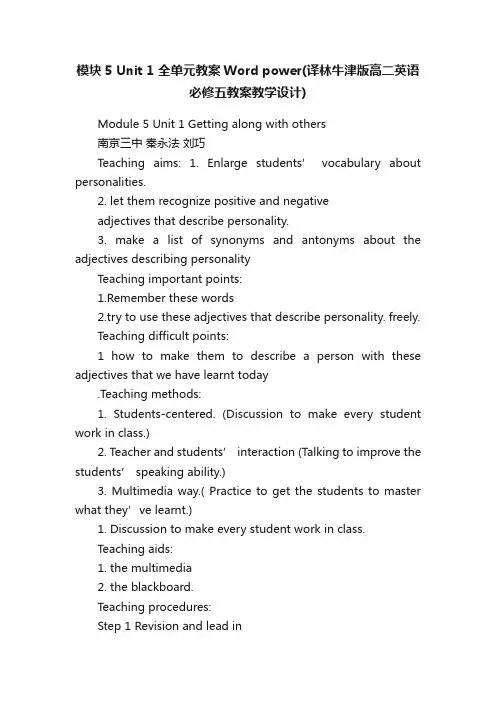
模块5 Unit 1 全单元教案Word power(译林牛津版高二英语必修五教案教学设计)Module 5 Unit 1 Getting along with others南京三中秦永法刘巧Teaching aims: 1. Enlarge students’ vocabulary about personalities.2. let them recognize positive and negativeadjectives that describe personality.3. make a list of synonyms and antonyms about the adjectives describing personalityTeaching important points:1.Remember these words2.try to use these adjectives that describe personality. freely.Teaching difficult points:1 how to make them to describe a person with these adjectives that we have learnt today.Teaching methods:1. Students-centered. (Discussion to make every student work in class.)2. Teacher and students’ interaction (Talking to improve the students’ speaking ability.)3. Multimedia way.( Practice to get the students to master what they’ve learnt.)1. Discussion to make every student work in class.Teaching aids:1. the multimedia2. the blackboard.Teaching procedures:Step 1 Revision and lead in1 . Let students guess who is heHe was a soldier and died at an early age after the founding of PRC.He is ----helpful -----warmhearted------ unselfish/selflessChairman Mao encouraged us to learn from him on March 5th.In March every year, we learn from him to offer help to others2. He was Lei FengStep2 1. Have you paid attention the adjectives?All these adjectives are used to describe Personalities.2 Let’s have a try.Use some adjectives to describe people’s p ersonalities1 What kind of person is “Dae Jang Geum”?Smart Strong-willed Helpful Kind friendly Hardworking/diligent Creative Warm-hearted2 try to describe other people3 exercise(1) Match these adjectives to their meanings(2)step 3 read the dialogue on the text book1 The adjectives in red are negative The adjectives in blue are positive2 exercise1Generous warm-hearted reliable open-minded honest helpful politeFriendly dishonest narrow-mindedStubborn bad-tempered moody impolite unkind boring2Strong-minded---determinedshy ------timidFriendly------kindHappy-----cheerfulTry to tell the synonymsBrave-------courageousSmart-----cleverLoyal-----faithfulDiligent ------hard-workingPassionate----enthusiastic3 discussionDo you know Eight Honors and Eight Disgraces?What kind of personalities belong to Honors and what kind of personalities belong to Disgraces ?Step4 synonyms and antonyms1 Having the same or similar means------synonymsHaving the opposite meaning-----antonyms2 exerciseTry to tell the synonyms and antonyms3 discuss(1) read the story(2) Can you describe the personalities of the prince(3) What your decision will be if you were the old king?Step 51 keys to page7Answers1 easy-going2 quiet3 shy4 friendly5 honest6 hard-working 7serious 8 strict2 competitionTry to speak highly of your friends with as many positiveadjectives as you can to make the others believe that your friend is the best3 discussionIn your opinion, what kind of person is easy to get along with and make friends with?What characteristics would you not like a friend to have.Homework1 Try to find more adjectives that describe personalities2 chose one of your friends to describe with some of the words that we have learned today。
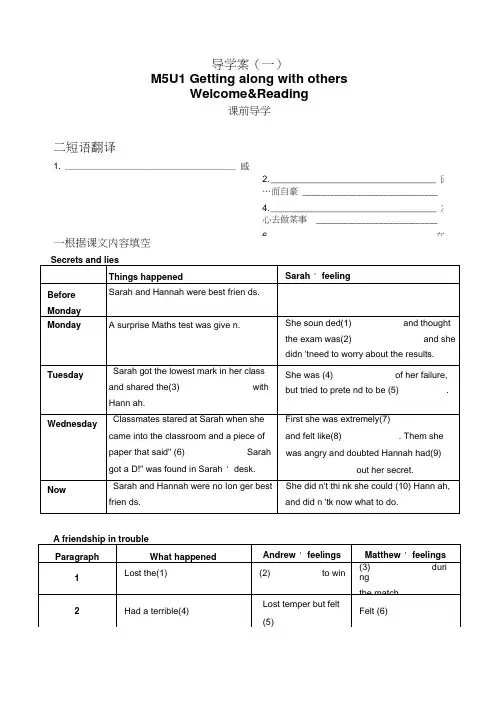
导学案(一)M5U1 Getting along with othersWelcome&Reading课前导学一根据课文内容填空二短语翻译1. __________________________________ 感2. _________________________________ 因…而自豪 ______________________________ 4. _________________________________ 决心去做某事 ___________________________6. ________________________________ 在9. __________________________________ 向某人道歉________________________________ 10.禁不住…… _________________________________课堂探究1. betray v.背叛,出卖泄漏,透露betrayal n./ betrayer n.背叛者betray sth to sb向某人出卖某事betray on eself 露出马脚,暴露身份betray one ' s country to the enem国投敌At no time ________________________________ (我都不会背叛我的祖国。
)2. admit admitted admitted admitting 承认+ n./doing sth./that •…1) John admitted _________ (know) little about the subject.2) The boy admitted that he had broken the window.那男孩承认是他打碎了窗子。
=The boy __________________________ the win dow.3) You must admit the work to be difficult.你应当承认这项任务是艰巨的。
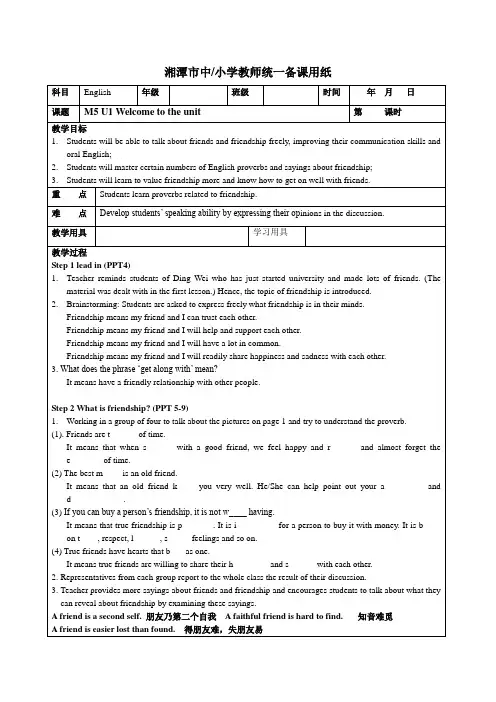
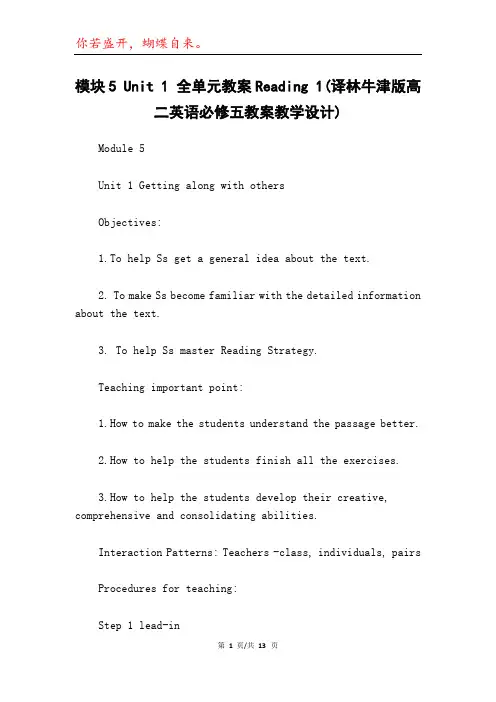
模块5 Unit 1 全单元教案Reading 1(译林牛津版高二英语必修五教案教学设计)Module 5Unit 1 Getting along with othersObjectives:1.To help Ss get a general idea about the text.2. To make Ss become familiar with the detailed information about the text.3. To help Ss master Reading Strategy.Teaching important point:1.How to make the students understand the passage better.2.How to help the students finish all the exercises.3.How to help the students develop their creative, comprehensive and consolidating abilities.Interaction Patterns: Teachers -class, individuals, pairsProcedures for teaching:Step 1 lead-inDiscussion1. Do you have any important events or unforgettable experiences with your close friends?2. Please share something with us and tell us what to do when meeting with difficulties in friendship.(1). If your friend tells others about your secrets, how will you feel and what will you react?(2). When your friendship is in trouble,will you stop talking with your friend and make a new friend?Conclusion1. We should keep our promise and keep friends’secrets. Honesty is one of the most important factors in the friendship.2. Friends should unite and help each other when meeting with some difficulties both in study or in other fields of life.In other words, we are supposed to take honesty and union as glory. But what are the shameful behaviors or the glorious?Next let’s learn something about it.以喜爱祖国为荣以危害祖国为耻以服务人民为荣以背离人民为耻以崇尚科学为荣以愚昧无知为耻以辛勤劳动为荣以好逸恶劳为耻以团结互助为荣以损人利己为耻以诚恳守信为荣以见利忘义为耻以遵纪守法为荣以违法乱纪为耻以艰苦奋斗为荣以骄奢淫逸为耻Step 2 Comprehension of the textFirst readingBy using these two rules, let’s go over the two letters for the first time and try to answer questions below.1. What did Sarah think about the surprise Maths test?She thought it was quite easy.2. What did Sarah tell Hannah in the girls’ toilet?She told Hannah how badly she had done in the Maths test.3. Why did Sarah tell Hannah that they weren’t going to be friends any more?Because she thought that Hannah had told everyone how badly she had done in the Maths test.4. Why did Andrew shout at Matthew after the match?He thought Matthew played badly and did not try hard enough. As a result, they lost the game.5.What did Matthew think about losing the match?He thought it was his fault.6. What kind of boy is Matthew? Is he usually a quiet boy?He is usually cheerful and out going.Second readingRead the article again and finish part C2. Try to identify how Sarah and Andrew felt and why they felt like so.Make sure you pick the relevant information within the given time.How Sarah felt Why she felt soHow Andrew felt Why he felt so..Step 3 Language items1.Match new words with their definitions2.Find out the similar words in the 2nd letterStep 4 Discussion1. Do you think Sarah and Hannah should try to be friends again or go their separate ways?2. If you found out that your best friends had made friends with another person,what would you think about this and what would you do?Step 5 Reading strategyHow do they show their strong feelings when meeting difficulties in friendship?1. I must be really stupid…. (line11)2. How they must have laughed behind my back! (line22)3. I was so angry that… (line23)4. It is really awkward….. (line 49)5. I can’t help wondering…. (line52-53)Step 6 Group workWork in groups and try to make a dialogue which is full of strong feelings.Suppose you were in a quarrel with your best friends, and turn to another one for help. You need to tell him the causes and how you feel about it. And the helper should give advice.Reading 2: Language FocusObjectives:1. Revise the reading passage by retelling it.2.Get the students to grasp the usage of some important words and expressions.3.Get the students to practice two important drills.Teaching important point:Dear Sarah;You have every right to feel_________by your friend if she did tell your secrets to others,but it seems unlikely that she did. You say that you are best friends; well, best friends talk about their problems and try to solve them. If she is a good friend, you should___________for blaming her.If you still have doubts, you should think aboutwhy you don’t believe her. Was it because youWere ashamed of your______or your behavior?Did you feel jealou s of your friend’s mark? If so,The problem lies with you, not her. Try not tosound too______of yourself when discussingMarks in front of others.However, if you feel that she is very bad atKeeping________and likes to embarrass you inPublic, you had better find a new friendDear Andrew,It seems you need to apologize quickly to avoid losing a ggod friend! Don’t forget that things are important to people, even when they don’t shout about them. The _______wa s probably very important to Matthew and he felt______about losing, and bad about not being as gifted at football as you are.A football team needs all the players to workTogether and help each other. Each playerShould play to their strengths. Shouting at yourTeammate was unfair and just made him feelworse. Although you both said________thingsto each other, one of you has to be first to say Sorry. Don’t be stubborn.You say that your__________as important asFootball. Well, then you should be__________ To get your friendship back. Don’t delay. Talk toYour friend and I’m sure before long, you’ll beBack playing football together.language points1.We have been good friends since primary school.(line7)(1).Unemployment in that country is now at its lowest level since WWII.该国的失业率处于二战以来的最低水平.(2).She left her hometown five years ago. We haven’t seen her since.自那以后=from then on(3).It is just three days since they arrived at the mountain.(4).Since you are so busy, perhaps we shuold ask someone else.2.We are no fun.(un.) (line5)(1).Her baby is great fun./ sailing a boat is great fun. (好玩的人/事)(2). I write not just for the pay, but for fun.(乐趣).We had a lot of fun at the party.(3).They often make fun of me for this.Donn’t make_____of the blind man.A funB funsC funnyD a funfun 做名词时不行数,不能与a连用,也没有复数形式.3.Must (when guessing,there seems to be no other possibilities) (line8-9)(1).I must have sounded very proud of myself.我当时的口气听上去确定很得意.You must have left your wallet in the office.你确定是把钱包落在办公室里了.(2).may have done(it’s not certain)Something may have happened to her.可能她发生了什么事.4.feel like(have an inclination or desire for) (line11-12)(1). I feel like I was overlooking my studies.(2). I felt like crying.我的父母晚饭之后总是想要出去漫步.My parents always feel like going out for a walk after supper.feel like表示想要做某事,后可加doing sth.也可以加that clause.5.I was overlooking my studies. (line12)(1).forget/not see something importantwe should not overlook the difficulties.你若盛开,蝴蝶自来。
Unit1 Getting along with othersPeriod 1 Welcome to the unitTeaching Aims:1). Encourage students to involve in the discussion and to practice their oral English.2). Discuss the friendship.Difficult Points:Encourage the students to share their opinions by fully participating in the discussion in order to get information about the friendship.Teaching ProceduresStep 1 Lead-in Presentation1).Report your findings:Proverbs about friendship .If you can buy a person’s friendship, it’s not worth having.One of the purposes of making friends is to learn from those who are better than oneself, or to teach one who may not be so good. So, if we make friends just for things or money, we are just doing business with others. A friend in need is a friend indeed. Fair-weather friend is the bomb of oneself, and also it is the tomb of oneself.In easy times it is difficult to tell true friends from false ones. In hard times, nature of friendship is discovered. In hard times, a true friend draws closer, while a false one turns away.True friends have hearts that beat as one.①The friendship in our young hearts is pure, fresh and simple. I often feel very lucky to have a lot of goodfriends to share happiness and sorrow together.②I do believe friendship is very important for every one. And we make many friends during different period.Some friends for talking with, some for studying with, some for playing with ....... And only a few for communicating by heart.2).If so, who are your friends for talking with, and who are your friends for playing with, for communicating byheart?3).Listen to a songTo My FriendYou have such apositive outlook on lifeYour words are always encouragingYour face is lit up with excitementYour actions are so straightforwardYour inner strength helps you achieve so muchWhen people are around youthey seem to absorb your uplifting attitudeWhen I think about youI can only thinkof happinessand how lucky I amto know youStep 2 Discussion•Do you have a best friend? Why do you think he or she is your best friend?•Have you ever experienced the situation ________ you were cheated by your friend? What is the detail?And do you think whether he is a fair-weather friend?•How do you get on with your friends? How do you help each other when you have problems?•What do you think are the most important characteristics in a friend?Step 3Sing a songAuld Lang Syne (友谊天长地久)Should auld acquaintance be forgot, and never brought to mind?Should auld acquaintance be forgot, for the sake of Auld Lang SyneIf you ever change your mind, but are leaving leaving me behind.Oh, bring it to me, bring your sweet love, bring it home to me.I gave you jewellery and money, too.That’s all, all I did for you.Bring it to me, bring your sweet love, bring it home to me. Yeah, yeahDarling, you know I laughed when you left,But now I know that I only hurt myself.Please bring it to me, bring your sweet love, bring it home, bring it home to me.For auld lang syne, my dear, for auld lang syne;We’ll take a cup of kindness yet for the sake of Auld Lang Syne.Step 4 Language Points1. make friend s 主语即使是单数也要用复数形式makes friends again ( with ) (与…)言归于好,重修旧好make enemies 树敌2. get along/ on withHow do you get along with you new girl friend?We will get along without that much money somehow.3. worth , worthybe worth + money(the price) 值……钱be (well) worth doing sth (很)值得做某事(worth 前的修饰副词只可用well,不可用very, much 等)be worthy of sth. / of being done / to be done 值得……①The trip was expensive but it was worth every penny.②The book is worth reading.It’s worth reading the book.③The article is worthy ofcareful study/ of being studied carefully. / to be studied carefullyStep 5 Homework1). Rewiew the lesson2). Prewiew Reading PartExercise : Reading。
M5 Unit 1 Getting along with othersGrammar: Verb-ing as an adjective or adverb学习目标:1.能够了解动词不定式和动名词的主要用法,并能够正确的运用。
2.通过练习巩固所学语法。
课前学习:1.课前自学课本P28-31,了解并掌握动词不定式和动名词的用法。
2. 完成P29和P31上的相关练习。
课堂学习:现在分词分词分为现在分词和过去分词,除和助动词一起构成时态外,还可以是非谓语动词。
分词做非谓语动词使用是高考考查的一个重要语法项目。
2. 用法现在分词表示主动和进行,可同它的宾语、状语构成分词短语,在句中作定语、状语、表语、宾语补足语。
(1) 做定语单个的现在分词作定语一般放在被修饰的名词之前;而现在分词短语作定语则放在被修饰的名词之后。
The sleeping child is Jack’s little sister.He is a promising young man.Tell the boy playing outside not to make any noise.The young man sitting under the tree is my brother.现在分词作定语时,所表示的动作既可表示正在进行的动作,也可表示经常性,习惯性的动作或现在的状态。
His father works in a factory making color TV sets.=His father works in a factory that makes color TV sets.The young man sitting between John and Mary comes from Canada.=The young man who is sitting between John and Mary comes from Canada.(2 ) 作表语现在分词作表语时,主语通常是无生命的事物,现在分词用来说明主语的性质、特征,此时现在分词已经具备了形容词的特征。
M5U1---Language Points(1)1.★翻译下列谚语Friends are thieves of time.The best mirror is an old friend .If you can buy a person’s friendship, it’s not worth having.True friends have hearts that beat as one.A friend in need is a friend indeed.A friend is not so soon gotten as lost.2.★make friends with (动作), be friends with 与、、、友好(状态)develop friendships with 与…建立友谊e.g: The poor office clerk tries his best to approach his manager, hoping to ____ him.A make friends withB to show friendships toC makes friend withD be friend with3. ★What do you think are the most important characteristics in a friend?该句中do you think 为插入成分,类似的有do you suppose, do you believe, do you expect, doyou suggest等该句结构为:特殊疑问词+do you think +陈述部分e.g: How long do you think he will stay here ?What song do you think he should sing at the party?◆Where do you think ___ go so late?A of himB he doesC can heD he can◆be sent to work there?A. Who do you suggestB. Who you suggest that shouldC. Do you suggest who shouldD. Do you suggest whom should4. ★beat; strike; hit,knockbeat: 有规律有节奏地拍打, knock 敲击,strike: (钟)敲;划(火柴);(灾害,疾病)袭击, hit: 打;击hit sb on the (part of the body)e.g The waves were ________ on the shore.The clock has just ________ 3 o’clock.The area was _______ by bird flu.She _____ him on the head with a book.It is freezing cold here. ______ a match and make a fire.◆--- either you or he going to visit the exhibition?--- He is. I can’t working until six o’clock.A. Is, knock offfB. Are, knock offC. Are, knock awayD. Is, knock away◆The younger of the two noblemen was by the little girl’s natural beauty.A. struckB. knockC. beatD. hit5.★be worth n. (表示金额,价值)worth “很值得”,要用well 修饰doing(主动形式表示被动含义)be worthy of. +n 配得上,值得to be done 值得做of being done 值得做It is/was worthwhile to do sth.doing sth. 值得做e.g: The lecture is worth listening to .I don’t think the film is worth seeing twice.The book is well worth reading.The dictionary is worth fifty yuan.◆What he said at the meeting was very _____.A worthy of our attentionB worth noticingC worth being noticedD worthy of noticing◆Try to spend your time just on the things you find .A. worth doing themB. worth being doneC. worthy of doing themD. worthy of being done◆What a lovely party! It’s worth all my life.A. rememberingB. to rememberingC. to be rememberedD. being remembered◆They all say Titanic is a good movie which is worth second time.A. seeing theB. seeing aC. to see aD. being seen the◆---Have you read thisbook?--- Yes. But the one is worth reading. I suggest you read it if you have time.A. bestB. wellC. betterD. more◆I bought some new shoes which are very ___ I bought before.A different from onesB different from a pairC different with the onesD different from the pair◆A useful ___ of the cat is its ability to catch and kill mice.A characterB characteristicC signD symbol6.★betray Vt. 出卖,背叛, 泄露/显示某事betray one’s country 卖国betrayal n. 背叛,出卖;泄露,暴露, 背叛者,卖国贼e.g: He said he was sorry, but his eyes betrayed his secret delight.For years they had been betraying state secrets to Russia.◆He has been accused of his former socialist ideals.A. betrayingB. contributing toC. devoting himself toD. betraying to7. ★We have been best friends since primary school and spend almost every day with each other.Since常用句型:It is+段时间+since+一般过去时的从句现在完成时的主句+since+一般过去时的从句现在完成时的句子+since+ 点时间短语易混淆句型:I t will be +段时间+before+一般现在时的从句。
模块五 Unit 1 Getting along with others一、高考考点考例点拨1. I must have sounded very proud of myself after the test, saying loudly how easy it was and how I was sure to get a good mark.(P2,line8)[考点] must + have done意思是:一定已经做了某事,表示对过去发生的事情的肯定猜测。
[考例] ----The woman biologist stayed in Africa studying wild animals for 13 years before she returned. (NMET 05,江苏)----oh, dear! She ______ a lot of difficulties!A. may go throughB. might go throughC. ought to have gone throughD. must have gone through2. We went to wash our hands in the girls’ toilets before lunch and I admitted how badly I had done…(P2,line 16)[考点] admit 表示承认,接纳。
常用以下搭配:admit sb. into/ to sth. /admit doing sth./.that- clause[考例] They were clearly long-standing customers, and I suppose they must have stayed faithful to him because he had promised to sell good quality fruit. He had a way with them----I had to ____that. (NMET 05,江西完型填空)A. admitB. expectC. announceD. promise3. He seemed absent-minded and as a result of his carelessplaying, we lost the game.(P3,line38)[考点] as a result of 表示由于,后常接名词代词,或动名词及其名词从句,而as a result 表示结果,后常接表示结果的句子。
M5U1 Getting along with others第一课时 Welcome to the Unit一.谚语配对。
根据英文,从方框内找出相应的译文。
( ) 1. Without a friend, the world is wilderness. ( ) 2. Prosperity makes friends and adversity tries them. ( ) 3. A friend in need is a friend indeed.( ) 4. A friend without faults will never be found. ( ) 5. Friendship cannot stand always on one side. ( ) 6.Friends are thieves of time. ( ) 7. If you can buy a person’s friendship,it’s not worth having. ( ) 8.The best mirror is an old friend. . ( ) 9. True friends have hearts that beat as one.. ( ) 10. Between friends all is common. ( )11.A life without a friend is a life without a sun . ( )12.A bosom friend afar brings a distant land near.重点句型If you can buy a person’s friendship,it’s not wor th having.题目.1. It is ______ to read the books our teacher recommended , for they are well _____ reading.A. worthy; worthwhileB. worth; worthwhileC. worthwhile; worthyD. worthwhile; worth2.It is said that the Slender West Lake is worthy ________.A. to visitB. of visitC. a visitD. of being visited第二课时 Reading预习检测1. He would rather die than ________(背叛) his country.2. He's a popular child, but not very a____________ at school.3. Afterwards ,I ______ (假装)to be cheerful, but Hannah sensed something was wrong.4. Last weekend, at the school gate I met a stranger, who asked me how many students had been __________ (录取)into the school this year.5.Mr. Wang knew that he had hurt his wife and ________ (恳求)her to pardon him.6.She ___ ____ (发誓) that she had never seen him before.7. I’ll never________ (原谅) you for what you said to me last night.8.Ever since I had my son, my ________(焦点,重点) is not me, it’s on him9. He is d________________ to take part in the international speech competition.10. His school results are not very good because he is often (心不在焉的) in class.11. As students, we should treat our teachers in a respectful m___________.12. That crying boy was __________ (谴责) of lying by his teacher.13.She felt g____________ about leaving her sick child alone and going to work.14.The guests made a number of ______ (评论) about the service of the hotel.15. The children were a__________about which programme to watch.16.The things he said hurt me too, but he has not __________(道歉)to me.17.Some children may be highly _________(敏感的)to sounds, smells, or touch.18.If you ever got into a __________(不一致) with any one of your best friends, how would you deal with it?重点短语1.承认做了....admit__________sth2.乞求某人做某事__________sb__________do sth3.__________one ’s secret 保守秘密4.feel__________doing 想要做某事5.遵守诺言keep one ’s__________6. belong__________属于7.spy__________暗中监视,窥探 8.focus__________集中于9.与...步调一致keep pace__________ 10.由于,因为as a result__________11.__________this manner 以这种方式 12.turn__________变成...13.指控,指责__________sb__________ 14.make__________ __________对...进行评论15.argue__________sb__________sth 与某人争论某事 A. 友谊不能总是在一方。
B. 富裕招致朋友,困苦考验朋友。
C. 没有朋友,世界成了荒野。
D. 朋友是时间的窃贼。
E. 没有缺点的朋友永不可得。
F.患难时的朋友才是真正的朋友。
G .朋友之间不分彼此。
H.真正的朋友心心相印。
I.人生没有朋友,犹如人生没有太阳。
J.最好的镜子是老朋友。
K.海内存知己, 天涯若比邻。
L.如果你能买到一个人的友谊,它不值得拥有。
16.apologize__________sb__________sth 为某事像某人道歉17.情不自禁地做某事cannot help__________sth18.与某人争吵某事quarrel__________sb__________sth19.对....敏感be__________ __________ 18.对...羞愧be ashamed__________20.在于某人lie__________sb 21.因...责备某人blame sb__________sth22.在公开场合__________public 23.避免做某事avoid__________sth24.对....感到愧疚feel guilty__________ 25.在...有天赋be__________ __________26.与...不一致,不同意in disagreement__________27.与...一致,同意in__________with28.不久,很快__________long课文讲解1.betray(1).Sarah told me that she felt ______ (背叛) by her friend Hannah.(2). He shouldn’t b_________ his country to the enemy.(3)She said she was sorry, but her eyes b her secret delight.2. Sometimes other children say we are no ___________because we are both very ____________ and like to study.We are both very ____________ and we both get good __________ at school.3.昨天我们突然考了数学,在班级我取得了很好的分数。
(surprise)_______________________________________________________________________________ ___________________________________________________________________________4.小测验之后,我说起话来听上去一定洋洋自得,说它实在太简单了,我肯定能取得好成绩。
(P2 line8)I____________ ____________ ____________very proud of myself after the quiz, ____________how easy it was and how I was sure to get a good grade.(1) 情态动词must在句中表____________猜测,“____________”。
must+have done 表示对已经发生的行为或状态进行肯定猜测;must be doing...表示对正在发生的行为进行肯定猜测;must be +adj./n.+prep./ adv.表示对目前的状态或身份等进行肯定猜测。
例如:He must be tired,______ ______?他一定累了,是吗?He must be reading in the library,______ ______?他一定正在图书馆读书,是吗?He must have gone to Beijing,______ ______?他一定去了北京,是吗?He must have attended the meeting yesterday,______ ______?题目:Jack his homework,for he is playing football outside.A.must have finishedB.must finishC.can't have finishedD.might have finished----I knocked but nobody answered the door.----They ________ asleep then and didn't hear you.A. should have beenB. should beC. must have beenD. must be(2) 句中的“saying...”为现在分词短语充当伴随状语,表示谓语动词发生的同时,该行为或状态也同时出现。